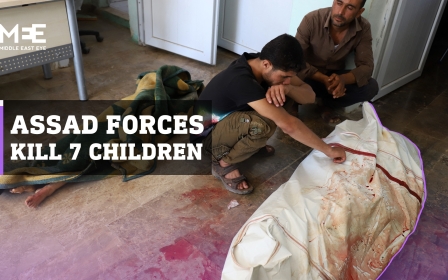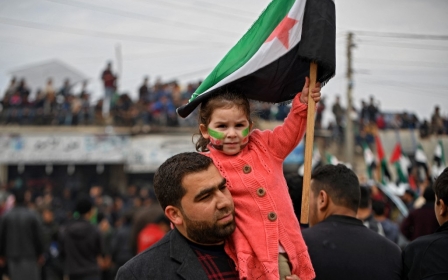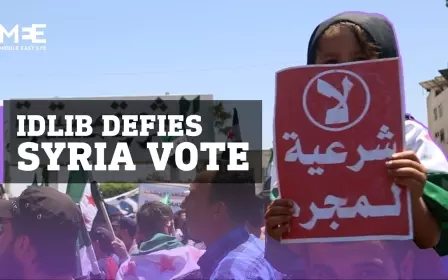In pictures: Displaced Syrians call on world to extend opening of vital border crossing
The Bab al-Hawa crossing from Turkey into Syria is due to close on 10 July, if a United Nations Security Council vote does not extend an agreement to keep it open.
On Tuesday, the United States, Ireland and Norway called on the Security Council to extend the agreement for another year.
"We cannot accept less than what we have today. And that's one border crossing for 12 months that's providing support for millions of Syrians," the US ambassador to the UN, Linda Thomas-Greenfield, said, warning that the border’s closure would mean that “people will starve to death” in the war-torn northwest of Syria.
The picture shows a girl playing next to the tents of the displaced in the Al-Tah camp, located northwest of Idlib Governorate, on 3 July, 2021. (MEE/Asaad Al Asaad)
Bab al-Hawa, the lifeline and the main point of arrival for international aid, is located in the rebel-held northwest of Idlib governorate, where some four million people live, most of whom are displaced.
Trucks still pass through it, but aid supplies may be cut off if it is closed.
The UN Security Council's mandate to provide humanitarian aid, now reduced from four main international crossing points to one border crossing from Turkey into northwest Syria, expires on 10 July.
Russia, an ally of the Syrian regime, which has the power of veto, is pressing to close the Bab al-Hawa crossing and divert the access of all aid entering the country through the Syrian regime, even to areas outside its control.
The picture shows the commercial yard at the Syrian side of Bab al-Hawa border crossing, with a number of UN trucks loaded with humanitarian aid, as they prepare to enter the countryside of Idlib, on 29 June, 2021. (MEE/Asaad Al Asaad)
The Bab al-Hawa border post with Turkey is a humanitarian crossing and the only crossing serving northwestern Syria. Most of the emergency patients exit through it to complete procedures in Turkish hospitals. It is also an important commercial crossing, as all imported goods enter through it.
Mazen Alloush, the media spokesman for the crossing, told Middle East Eye: “Bab al-Hawa crossing is the only vital artery that feeds the areas of northwestern Syria, through which all citizens’ needs enter, including building materials, humanitarian aid and others. And it is the only outlet to transfer patients to Turkish hospitals.
"Bab al-Hawa crossing is the only crossing that brings aid into Syria. The number of UN relief trucks that entered during the first half of 2021 was about 6,200, carrying 140,000 tonnes of relief materials. This aid was delivered to UN partner organisations, which in turn distributed it to the displaced and tent dwellers in this area.”
The picture, taken in the Al-Tah camp in northwestern Syria, shows a group of children living in the camp, on 3 July, 2021. (MEE/Asaad Al Asaad)
Alloush warned that if the UN mandate was not renewed on Friday, there would be a risk of “a humanitarian and economic catastrophe” for the area.
About 1.5 million people would lose their right to access aid, he warned, and more than 2.3 million people would lose access to clean drinking water. The closure of the crossing would also lead to the end of crucial support for more than half of the hospitals in northwestern Syria, in addition to relief for dozens of bakeries providing people with bread.
“Bab al-Hawa is not only a border crossing; it is a lifeline for more than 4 million people. We would like to send a message to the entire world that closing the crossing will aggravate the Syrian crisis.”
The picture, taken in the Al Tah camp, shows a displaced Syrian girl looking at the camera as she sits outside the tent in which she lives with her family, 3 July, 2021. (MEE/Asaad Al Asaad)
For those who live in tents in the camps in northwestern Syria, the prospect of closing the Bab al-Hawa crossing is devastating.
Abd al-Salam Abu Muhammad, one of the displaced people living in the al-Tah camp, northwest of Idlib, told MEE:
“After Russia displaced us and demolished our homes during its military campaign, it is now attempting to close our lifeline. Bab al-Hawa crossing is our only hope for life. We will starve to death if it is closed.”
Russia is seeking to close the border crossing with Turkey in order to divert all international convoys to the areas controlled by the Assad regime, which is facing an economic crisis.
To achieve this goal, Russia has besieged the Idlib governorate from all directions, as it did with all the Syrian regions that revolted against the Assad government.
“We are very scared of the decision to close the border crossing. We hope it will stay open, because the residents of tents will not tolerate a new siege after losing everything in their towns and cities that were controlled by the Russian-backed Syrian regime,” Abu Muhammad said.
The picture, taken in the Al-Tah camp in northwestern Syria, shows a group of children playing in the camp, on 3 July, 2021. (MEE/Asaad Al Asaad)
Middle East Eye delivers independent and unrivalled coverage and analysis of the Middle East, North Africa and beyond. To learn more about republishing this content and the associated fees, please fill out this form. More about MEE can be found here.




